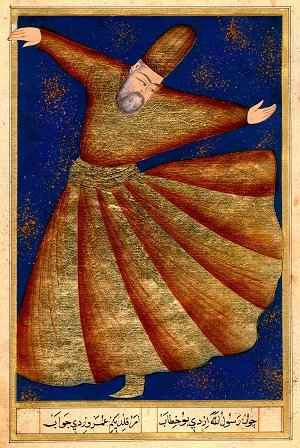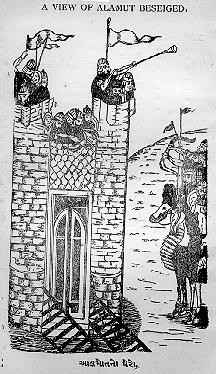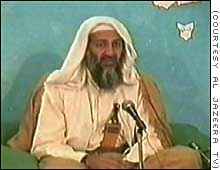|
Islamic Heresies With all due respect to everyone involved, you can't throw a rock into a crowd of Muslims without hitting someone whom all the other Muslims consider a heretic.
With all due respect to everyone involved, you can't throw a rock into a crowd of Muslims without hitting someone whom all the other Muslims consider a heretic. Every single person practicing Islam in the world today is a heretic in the eyes of at least one other such person. The Western mindset may not be properly equipped to understand the scope and breadth of how Islam functions. While primarily Christian cultures do have diverse views of Christianity, the West has slowly moved toward a "live and let live" attitude that is dramatically different from how Islam is defined in the East. The major distinction is that Christian sects (such as Catholicism, Mormonism, Anglican, etc.) are considered to be different "religions" that co-exist peacefully but do not really overlap. Conversely, Islam is predicated around absolutes—"There is no God but God, and Mohammed is his Prophet." The general notion is Islam is monolithic virtually anyone accepting that statement is considered a Muslim but in practice, Islam is incredibly diverse. The first major split in Islam took place about five seconds after Mohammed died. Because he had made no plans for succession, Mohammed's earliest followers disagreed over who would lead the Islamic nation after his death. Some, known as Shi'a Ali (the party of Ali), believed that Mohammed's son-in-law and his subsequent descendants should inherit the job (more on this below). The majority view (eventually known as Sunni) called for an elected leader, the Khalifa, or simply the Caliph. Originally a political division, the conflict between Shi'a (also called Shi'ites) and mainstream Muslims, eventually known as Sunni, slowly became a religious schism over the rightful leadership of Islam, and subsidiary issues having to do with somewhat more arcane legal distinctions. The Shi'a and Sunni headings encompass the vast majority of Muslims in the world. Some members of each branch consider the other heretic, but others see the distinctions as purely political. The two major schools of Islam are intermittently at war with each other (more so when there's no external enemy to focus on, but that doesn't always stop them).
After Shi'a and Sunni, the two best known Islamic sects are the Sufis and the Ismailis, both of which are considered heretical by many mainstream Muslims. Sufism is a mystical branch of Islam which emphasizes prayer and transcendent rituals such as ecstatic dance ("whirling dervishes" are Sufis). Like the Christian Gnostics, Sufis believe that Allah reveals himself to individuals on a personal level. This notion doesn't sit will with the authoritarian hierarchies of mainstream Islam. One famous tenth century Sufi teacher was crucified for heresy. The most famous Sufi of all was the poet Rumi, who preached religious tolerance and wrote classic tomes of poetry with decidedly homoerotic overtones. Rumi was branded a heretic but managed to avoid execution. Some Sunnis accept Sufism as a legitimate part of Islam, but fundamentalist sects such as Wahhabism don't. But then Wahhabism, a sub-sect of Sunni that demands a literal interpretation of the Koran, is also considered heretical by some other Sunnis. And Wahhabbism is much more recent, only dating back to the 18th century, whereas Sufism can trace its origins as a formally structured order to no later than the 12th century, follwing a tradition to that goes as far back as the time of Muhammad himself. On the other side of the fence, Ismailism is a sub-sect of Shi'a Islam. Ismailism also tends toward the mystical. Its modern incarnation is decidedly pacifist and extremely tolerant of other religions. That's today, of course. In the past, the Ismailis gave birth to their own sub-sects, including one of the most famous heresies in Islam, the Nizaris—aka the Assassins. The Assassins were born in the 11th century and survived in meaningful numbers for a couple hundred years. Assassins were Shi'a Muslims who worked rather aggressively to protect the interests of Ali's descendants. The Assassins practiced a strict regimen of initiations and degrees, often structured more like a secret society than a religion. They were famous for opposing (or possibly colluding with) the Knights Templar. Initiates were trained as deep undercover agents who were trained to kill on command, without regard for personal safety. They were based in a nearly impregnable castle in Alamut, located in modern-day Iran. Those who died in the line of duty were considered martyrs and guaranteed safe passage to heaven. According to legend, the Assassins used sophisticated mind control to reinforce this idea. It's commonly believed that the Assassins dosed its followers with hashish to manipulate them with drug-induced visions of paradise, but the historical record is somewhat debatable.
Around the end of the seventh century, the descendants of Ali had been attacked and some number of them were murdered. Since the Shi'a believe the descendants of Ali are the rightful leaders of Islam, this obviously presented a problem. It wasn't clear whether there was a child survivor of the murderous attack. Some believed that the heir to Ali had been hidden by Allah, or by courageous Shi'a supporters. This hidden heir became known as the Madhi, and his role would evolve over time. Others threw their support behind different relatives of Ali whose bloodlines were less than ideal. The Ismailis (and later the Assassins) supported a genealogy of descendants that ran through Isma'il. In an effort to prevent another murderous attack, Isma'il's heirs kept themselves hidden. While this was effective at preventing their murders, it also opened the door to a lot of competing claims from people who felt they were the most legitimate heirs to Ali, and thus to the legacy of Muhammad himself. Alternatively, the Ismailis believed that the line of Ali continued through Isma'il and his descendants, with a rightful Caliph whose hereditary title is Aga Khan. (The current Aga Khan is a Harvard graduate who lives in Switzerland.) The Assassins supported one of the branches of a split in Isma'il's family tree, Nizar, as Caliph, the political leader of Islam. Ismaili daggers and fortresses were put to work on Nizar's behalf, but when he and his descendants were eventually killed, the Assassins conveniently claimed to have miraculously rescued one of his children to preserve the Caliphate under their auspices and direct control. Despite this incredible stroke of good luck, the sect mostly tapered off and died by the Middle Ages. Another sect, known as the Twelvers, is now more or less the mainstream Shi'a sect, representing most of the population of Iran. Bypassing Isma'il's claim, the Twelvers believe they believe that Mohammed's line had 12 legitimate successors (Imams) until the last, who was hidden (or "occulted") by Allah and will return one day to claim his place as the rightful leader of Islam. The idea of the Madhi spread eventually to some Sunni circles as well, although it doesn't mean exactly the same thing to Sunnis that it does to Shi'a. Although there is still a strong tinge of apocalyptism to the concept, the Madhi in Sunni Islam is considered to be the last of a series of eight renewers of Islam. The emergence of a Madhi approved by both Sunni- and Shi'a would therefore present the startling prospect of possibly healing the schism and reuniting the vast body of Muslims under one theological banner. Realistically, the chances of that happening are just about zero. But that doesn't stop people from dreaming, often dangerously. In 1979, an armed band of extremists seized Mecca and attempted to overthrow the ruling Saudi monarchy. Assisted by a certain Mahrous bin Laden and the Muslim Brotherhood, the extremists followed a self-styled Madhi who entered Mecca during the assault, toting a gun. After a couple of weeks of standoff, the Saudis allegedly called in foreign soldiers for help, resulting in a theologically dubious attack to reclaim Mecca. Whatever else the assault proved, it did demonstrate that the Madhi was less than he claimed to be. He was killed in the attack. If you're thinking that Mahrous sounds familiar, you may have heard of his younger brother, Osama bin Laden, and therein lies a murky tale of the future of Islamic heresy. The sectarian nature of Islam demands a certain amount of internicene tolerance. Nevertheless, there are some things that can really get you into trouble. For instance, a Tuscon Sunni imam named Rashed Khalifa was murdered over his claim that two tiny verses of the Koran were invalid. Another way to cause big problems is Madhi-ism. Many outside observers of Islam (i.e., infidels) believe that bin Laden may be working toward an ultimate theological goal in which he is "revealed" to be Madhi at a dramatic moment. (If you've been reading this and wondering how Islamic heresy really affects your life, then pay attention, because we just got to that part.)
Either he'd be roundly condemned as a heretic and subsequently shunned by the vast majority of the Islamic community (which already has its doubts about him), or he'd instantly become leader of a superpower without borders, commanding the loyalty of millions or even billions of believers around the world. Which outcome you get depends on how much time and effort is put into crafting some sort of a historical claim to the lineage of Ali, and a number of other extremely complex factors. It would be a very, very tall order to pull it off, but the right kind of claim could even unify Shi'a and Sunni in a political-religious bloc covering a third of the world, including its richest oil fields. Additionally, if bin Laden did win widespread acceptance as Madhi, it would likely be intepreted as a major hallmark of the apocalypse by many Muslims. Since al Qaeda is already made up of guys willing to blow themselves up for al Qaeda even without this complication, well, you can just imagine the mayhem that would ensue. Take one part September 11, and one part World War II. Add the collapse of the oil economy, and a dash of Weapons of Mass Destruction. Stir vigorously and heat until boiling...
|
 However, the Shi'a-Sunni conflict is only the tip of a very large iceberg of disputes. In addition to a handful of completely separate sects, both Shi'a and Sunni communities are divided into thousands of smaller sub-sects and cults with a shockingly diverse array of beliefs.
However, the Shi'a-Sunni conflict is only the tip of a very large iceberg of disputes. In addition to a handful of completely separate sects, both Shi'a and Sunni communities are divided into thousands of smaller sub-sects and cults with a shockingly diverse array of beliefs.  The Assassins arose in the middle of a major crisis in Islam, which would lead centuries later to a whole slew of new heresies. Chief among them is the notion of the Madhi, the Islamic version of the Messiah.
The Assassins arose in the middle of a major crisis in Islam, which would lead centuries later to a whole slew of new heresies. Chief among them is the notion of the Madhi, the Islamic version of the Messiah.  If bin Laden successfully assumed the role of Madhi, and if he did so with an eye toward reconciliating the branches of Islam, one of two things would happen (to reduce things to the most simplistic outcome).
If bin Laden successfully assumed the role of Madhi, and if he did so with an eye toward reconciliating the branches of Islam, one of two things would happen (to reduce things to the most simplistic outcome).